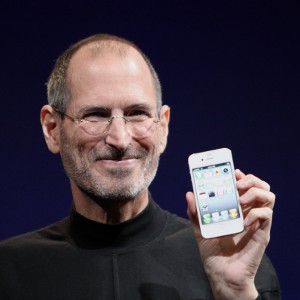After 35 years of shaping the computer industry, Steve Jobs announced that he is resigning his position as CEO of Apple. Jobs has served as CEO since July 30, 1997. In that time the company’s stock soared 9,020 percent, so that for a brief time this month, Apple was the largest company in the world, valued at $350 billion.
But Jobs was more than just the CEO of Apple. He was the personality most closely identified with the company—compare Jobs’s name recognition with that of Rex Tillerson, CEO of Exxon. Jobs was the visionary behind each new product, from the iPhone to the iPod to the iPad, and even in the massive new Apple headquarters planned for Cupertino.
So closely was he identified with the company that news of his resignation caused Apple stocks to tumble, even though the announcement was made after the closing bell. They fell 5.1 percent last night in after hours trading, erasing $17.7 billion from their total value in just a matter of hours. It is worth remembering, however, that when Jobs took over Apple, its shares were worth just $9.
This poses an enormous challenge for his successor, COO Tim Cook. “When he [Jobs] is in, the stock outperforms. The stock will languish until Cook can reassure investors and demonstrate his value,” said Matt McCormick, a money manager at Bahl & Gaynor. Cook has served successfully in the past, when Jobs was took medical leave from the company, most recently in 2009, when Jobs had a liver transplant. At the time, Apple’s stock climbed 66 percent. This time, however, the finality of Jobs’s statement took a toll on the company.
But the dip may have been unfair. While Jobs announced that he was resigning as CEO, his letter of resignation read, “I would like to serve, if the Board sees fit, as Chairman of the Board, director and Apple employee.” In each of these capacities, he still has the capacity to determine the company’s direction in the coming years, and his resignation letter indicated that he intended to do so: “I believe Apple’s brightest and most innovative days are ahead of it. And I look forward to watching and contributing to its success in a new role.”
The Board concurred and responded with a press release stating that, “Jobs has been elected Chairman of the Board and Cook will join the Board.”
Steve Wozniak, who cofounded Apple with Jobs, referred to his former colleague as “the greatest technology business leader of our time.” In a statement, he hoped to reassure investors, saying, “Company culture doesn’t change overnight.”
Analysts agree with the assessment and point out that Apple has already lined up its new product launched for the coming months, including the launch of a new iPhone in September. “Short term to mid-term, a lot of the groundwork has been laid in place,” says analyst Ray Wang of the Constellation Research Group.
JP Morgan’s analysts agreed, adding, “While the day-to-day contributions of Mr. Jobs will be missed, we believe that the level of creativity and intelligence assembled throughout the management team and legion of Apple employees can sustain the Apple model and its industry leadership.”
Mike Abramsky of RBC Capital Markets compared Jobs’s departure to the resignations of other iconic business leaders in the last century. “Similar to the departure of Henry Ford, Walt Disney—unique creative forces whose companies carried on for years—Apple without Steve will go on.” (It’s worth noting that when Jobs left Apple in the 1990s, he bought a little company named Pixar from George Lucas, so that today Jobs is also the largest shareholder in the Walt Disney Company.)
At the same time, he admitted that significant changes could lie on the horizon. “It’s hard to believe Apple won’t be different; Steve was involved in every detail of product, marketing, execution, deal-making (carriers, studios, etc.) and had the vision and gravitas to bet on disruptive innovations. Steve’s departure may precipitate Apple’s evolution from icon-led to team-led, from disruptive innovation to continuous innovation.”
Nevertheless, there are justifiable concerns. Jobs is more than just a businessman. He is just as much a “difficult, brilliant, charismatic, future-shaping personality,” as The New York Times describes him. While the skill set he had may be replicated—it may even be improved upon at some future time—can any group of executives mimic those very quirks which made Apple under Jobs what it is?
This is precisely the point that Ezra Gottheil of Technology Business Research makes in Computerworld: Three years out, Apple is less likely to dazzle, to explode. There will be more duds. But the product lines begun during the Jobs years will be executed very well.”
While Silicon Valley has its fair share of high tech rock stars, none brought the same drama, excitement, and excellence to their work as Steve Jobs. But long ago, he hinted that his role, like every role, must one day come to an end. “The people who are doing the work are the moving force behind the Macintosh,” he said. “My job is to create a space for them.” As he wrote in his letter of resignation, Jobs believes that Apple’s best days lie ahead. Perhaps he was simply creating a space for them.
Read More at NBC Bay Area.
Read More at the Washington Post.
Read More at Apple Insider.
Read More at the New York Times.
Read More at ComputerWorld.
Read More at The Mercury News.

 Music in the Past?
Music in the Past?  Nasmeh Named as Killer in Harms Case
Nasmeh Named as Killer in Harms Case 
